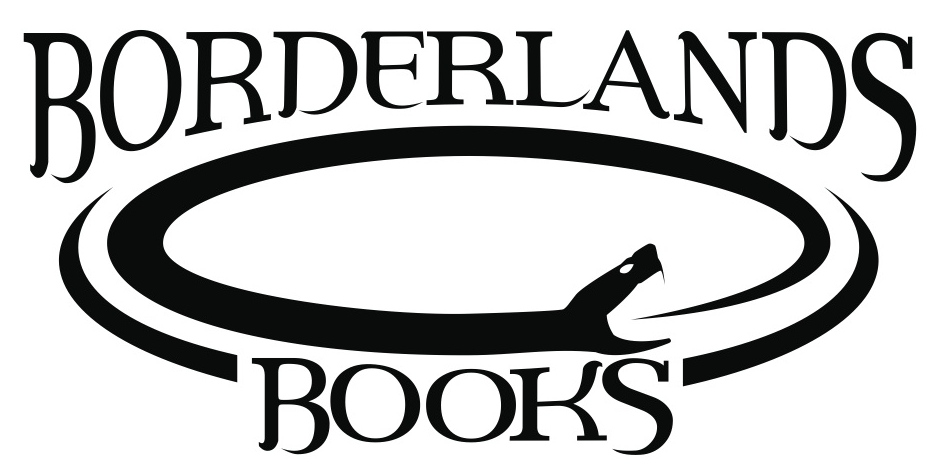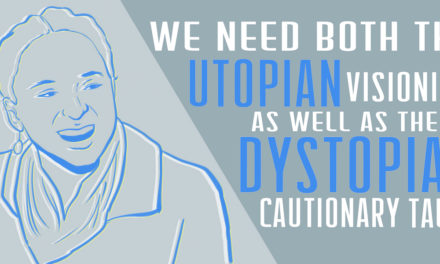The Business of Words
Interview with Alan Beatts of Borderlands Books
Issue 6: Industry | 3,236 words

From the first texts read aloud to us as children to the new Hugo winners we now itch to download to our eReaders, as readers, writers, and editors, we wouldn’t be here without the bookselling industry. To take a closer look at this industry, we interviewed Alan Beatts, the founder and owner of Borderlands Books. Borderlands Books is a treasure to Bay Area fantasy, science fiction, and horror nerds. If you love genre fiction, it’s a landmark you’ll always find an excuse to visit.
We met with Alan at the bookstore’s planned new Haight Street location, which Alan has been building out with a devoted team. Before the interview, Alan joked that we had to be ok with his current sawdust-chic look. Little did he know, but that comment only made us want to talk to him more.
After first peering through sheets of plywood to take a peek at the new store, we nestled into a table at the local coffee shop. First, we wanted to hear how it all happened. We thought it only made intuitive sense that it started with his love of genre fiction. To our surprise, Alan told us differently.
——————–
Speculative City: How did you come into the business of selling books?
Alan Beatts: It probably goes further back than just my relationship with genre fiction. My mother was an English teacher and got her Masters in English, my dad was a magazine editor and school teacher, my grandfather was a mystery writer, and my great grandfather was an editor for The Saturday Evening Post. So, the business of words kind of runs in my family.
But we’ll assume you weren’t just forced into loving literature from family pressure.
I was kind of a shy kid and not super socially skilled—which I’m sure you guys can’t relate to at all, so let’s just stretch for a moment. I’ve always loved reading. Really, my best friends growing up were books. The ones that I liked the best were science fiction, fantasy, horror. Mystery was more of a taste I developed later in life.
Books have helped us through social awkwardness too! And we have this magazine, so we definitely understand your love of reading. How did this love translate to creating a bookstore?
I originally worked in law enforcement, firearms training, private investigation. I did that till my late twenties. Then I decided I didn’t really like that business. So I quit and I spent a while kind of drifting around. I worked as a nightclub promoter and a DJ, then ended up managing a motorcycle shop.
At the motorcycle shop, I realized there’s two kinds of sales: there’s sales where you’re trying to get people to buy things they don’t really need or want, and there’s sales where you’re helping people find the thing that they want. Say someone comes in with a broken motorcycle to fix—you’re trying to help them, though you’re basically selling them something. I realized I really enjoyed that. So it was kind of a reductive process of “Well I don’t know what I want to do with my life; I think I want to run my own business; I think I want to do something that’s kind of customer service—what’s that going to be?” That narrowed down to what I really love: books. And that was back in the day when Borders and Barnes and Noble pretty much dominated the bookselling field. Trying to compete as a general interest bookstore didn’t really seem realistic to me, so I decided to have a very specific niche—the stuff that I liked the most—sci-fi, fantasy, and horror. And then later adding in mystery. So that kind of was the long circuitous process that got me there.
We actually thought the niche aspect of the bookstore wouldn’t be helpful. But going into the specialized made more sense in the end.
It made more sense in terms of being able to survive. In terms of a dream bookstore, I’d love to run a general bookstore, but have an enormous sci-fi, fantasy, and horror section. I like books and I like bookselling.
We definitely appreciate fiction in a larger sense, as well, but obviously lean heavily toward genre fiction. People can be so quick to cast it aside, but it takes real creativity and intelligence to create some of these works.
Genre fiction is so interesting! Fundamentally, the purpose of writing fiction is to entertain and engage people. You may accomplish other things. You may inspire. There’s fiction that talks about profound truths and what it means to be a human being. I’ve learned some very profound truths from reading fiction. But at base, fiction is there to entertain. And the thing about genre fiction is that you can’t slip by on literary pretension and style. You have to actually be entertaining. If you fail to do that, you won’t succeed. Whereas with a lot of literary fiction, you can kind of slip by on the fact that what you’re doing is clever or innovative.
You’re basically describing postmodernism, or the only reason any of us reads Ulysses.
Exactly. It’s true of so many supposed classics. I think some of Dickens is great, but some of his other works are just garbage, and it’s a waste of time to read them. They were a product of their period. They’re not undying classics. You actually should be reading something better. Read N. K. Jemisin. It’s a better use of your time.
And genre fiction has this ability to trick its reader. Literary fiction can be pretty on the sleeve—like a book about the existential crisis of a young man getting out of college. You know what it is; you know what you’re gonna get. In genre fiction, you read the set up a whole alternate society, and then, by the end, you’re like, “Oh, this is a reflection of my society.”
The other thing that’s really cool about genre fiction—science fiction, especially, but other genre fiction as well—is that it gives us a chance to play around with the ideas of both how we would like the world to be and what the consequences of the things that we’re doing now are. I think that science fiction lets us have a better thought-out future because it gives us the opportunity to think about and discuss what’s happening now. When we extrapolate that present we can then see where we may end up and if we like that or if there are problems.
Right, and that’s also why we started the magazine. We wanted to take a critical look at our society, which is what these fiction genres do. And in this issue, we wanted to further examine industry. Why we’re interviewing you is because you’re part of the bookselling industry.
That would be me!
We wanted to get into the nitty gritty of that. Every industry has its pluses and minuses. What have you enjoyed in this particular industry? And what have you completely detested?
What I’ve enjoyed is the people. All of them—from writers, editors, booksellers, customers, and the people I work with. It’s a business that’s filled with a group of people who are above average in terms of their kindness, consideration for other people, open mindedness, tolerance, imagination, and intelligence. And that’s really really cool.
You’re in the business too! When I say the “business of words,” I use it very deliberately, because writers, editors, publishers, booksellers, agents, we’re all in that business. There’s a lot of things that we all have in common. One of the things that everyone in the business of words has in common—it’s certainly something I don’t like very much—is that we’re not trying to get rich. Because we’re smart enough to know better. Very very few people get rich doing any of this stuff in our field. Not writing, not editing, not publishing. God knows not bookselling. Even a basic level of satisfaction—decent health care and a place to live, not eating top ramen twenty meals a week, being able to buy clothes when they tear—even that level is hard to get to in our industry.
We can relate to that. This is essentially a project we pay for in every iteration and an exploration of how we can monetize any of it.
But part of why I got into this business. I love it. I really really love it. So the downsides of it—it’s fine!
The industry is also changing fast. How has that affected your experience as a bookseller?
I think that we’re at a dynamic equilibrium that happens when everyone has made up their mind. Now it’s a matter of what decisions the people who are maturing are going to make. Ten years ago things were really unknown. Ebooks were becoming a thing. The amount of business that Amazon was pulling was getting greater and greater. Borders was, if I remember correctly, just about to go down the tubes. So things were really unstable. At this point, people will either buy books from Amazon or from bookstores. The only thing to change one of those behaviors is for someone to come into contact with a bookstore and for that experience to make them shift their buying habits away from Amazon. The shift now is with people in their teens who are heading to the point where they’re going to start making their own purchasing decisions. I’m making huge generalizations here, but they have less of an attachment to physical objects, in that sense of “I own a physical object that represents a movie, music, or a book.” And they’re also much more used to shopping online, and they’re less concerned about privacy, liability, and censorship issues. Someone who’s fourteen, when you talk to them about the problem of Amazon—that if Amazon decides that a book is pornography because it’s a calendar of gay firemen, that Amazon has then just censored that calendar—they don’t quite get it.
Does this imply we may get rid of physical bookstores in the future?
A Gutenberg Bible is going to be worth money as long as Gutenberg Bibles exist. A first edition of October Country by Ray Bradbury will be valuable. There will always be a desire for people to have a physical copy of that one special book. There will also always be people who love the book as an object or a work or a craft or an art, in the same way that people like and collect typewriters. I think the eventual place that we get to is that most books will be electronic or audio. There will be a pretty vibrant market in rare used books. But I do think that it will reach a point that every bookstore will be a new and used general interest bookstore. There won’t be enough physical books for there to be specialized stores, and bookstores may also do business in manuscripts or ephemera—letters, prints. The whole sort of “unique works on paper” may end up being what sort of business it is. People will still be selling books. People will still be making books.
There will still be fan communities. The Lord of the Rings will sit in a beautiful hardbound print copy on fans’ shelves.
Yes, I expect there will be a copy of The Lord of the Rings in print as a physical book—I hesitate to say forever, but when all of us are in a box. Our society is becoming more secular, but religious texts have always been subject to fine printing and fine bindings. The actual physical copy of religious text has a lot of great significance for people. People can feel that sort of passion and connection to fiction. I think perhaps more so now in the United States, people feel about works of fiction how they feel about any religious texts. So that will be the market.
Definitely. Devon has more than one edition of Harry Potter on his shelves. It’s something he grew up with and what helped him refine his moral code. And Meera has certain foundational works—a book of Ibsen plays—that she read in her early twenties that she always carries on her bookshelf. Sometimes the works we hold on to we don’t even love anymore, like Bataille’s Story of the Eye for Devon.
A book becomes a symbol, an icon of something. It’s not about the story or the origin.
Tying into changes in the industry, San Francisco has also been changing a lot. How has that changed your business? Has it changed the customer demographic?
I’m not super happy, personally, with how the city has shifted. And I have a lot of rage and a lot of blame for the government of San Francisco for mishandling what has taken place.
But, that aside, for the business I think that the change has been positive. People appreciate us even more because of the comparative rarity of businesses like ours now in San Francisco. That has prompted people to give us a lot more support than they would have had there not been a perception that businesses like us were at risk. And because of the general increase in affluence in San Francisco, the amount of support, on a strictly financial basis, has been greater than it would’ve been, say in 2008. We started a sponsorship program to make up for the financial shortfall from the rise in minimum wage. The sponsorship program has been oversubscribed every year since its start. So, the change was positive. But I don’t think it’s been positive for most small businesses.
It’s great that the bookstore has actually benefited from the change that’s been so difficult for many of us here. With the change in the city and region, and overall industry, have you noticed political or social situations affecting the types of books you sell? Over the years, have there been changes in the buyer demographic or upticks in particular genres/type of work sold?
Certainly. There has been an overall mirroring of larger social changes that we’ve seen in the United States in the last ten years. There have been a lot of shifts driven by that, and it’s not something unique to San Francisco. Orson Scott Card’s book sales have not done so well after he was a vociferous opponent to gay marriage. That hurt his sales. So there’s that on one end of the spectrum. On the other end of the spectrum is N. K. Jemisin winning three Hugo awards in a row and the success of her books. The books are good and deserve recognition, and I think the fact that they received that recognition is a result of shifting social attitudes within the United States and the world as a whole. So I’ve definitely seen that change within the twenty-two years I’ve been a bookseller.
In terms of the shift in San Francisco, the major changes that I see is that—it seems perverse—when perceived bad things happen, like when Donald Trump was elected, the sales of horror fiction and apocalyptic fiction go up. People in the real world are confronting something that’s frightening and causing them a great deal of anxiety, so it’s actually soothing to read something that is kind of confrontational. It’s like, you think you’ve got it bad, but this book is about a vampire who’s killing everyone in town. That type of fiction puts shape and form and a sort of simplicity to the anxiety that people feel. I’ve seen that happen a number of times—the second gulf war, it was the same phenomenon.
Both of us can relate to that a lot. When things are harder, Devon always says “I’m gonna watch something brutal and find catharsis by the end.”
My friend Jim, when he’s feeling kind of glum he’ll come into the shop and say, “So I’m looking for a disaster cozy.” It’s a time when he feels the need to curl up and read about the apocalypse to feel better. I think it’s one of the great benefits of horror fiction—it’s really confrontational. Horror presents really really bad stuff, often set in the day-to-day world. I think that it really helps people deal with fear and anxiety in their lives by confronting them. Horror writers are also some of the funniest, socially well-adjusted people that I’ve ever run into in my life.
Sounds like we have to more actively seek out horror writers. Thanks for the tip! It’s also great that Borderlands can be such a resource for disaster cozies. Considering the value and legacy of the bookstore, where do you see it in the future, post-apocalyptic or not?
As a whole, we have to allow for extinction level events: catastrophic earthquakes, sea level rise—things like that. But for Borderlands, first we’re going to get moved to the new building. Once that’s done, we’ll establish a non-profit with the purpose of educating people in fiction writing and, specifically, genre writing. Once that non-profit’s established, I’ll be rewriting my will so that both the company and building will be bequeathed to that non-profit. That non-profit will continue to operate the bookstore and own the building, and the income from the apartments in the building should be sufficient to cover the maintenance and carrying costs of the building indefinitely. The non-profit will run a physical bookstore in San Francisco, for as long as that is possible, with a focus on science fiction, fantasy, and horror, but not in exclusive. That’s because, as I was saying, with less and less books, more and more stores will start to carry a broader selection because they’ll have to. My hope is that I’ll be able to set up something that will last at least a hundred years, if not longer. That’s actually been the guiding principle in all the work that we’ve done at the building. So that’s what’s going to happen with Borderlands.
That’s a pretty solid plan—it doesn’t quite fit into our disaster cozy, which we’re grateful for this time! Thank you for talking with us at length about Borderlands and your relationship with the fiction we love. Before we part, would you recommend any pieces of literature that relate to what you do—running a bookstore in a city?
The Yellow-lighted Bookshop by Lewis Buzbee. It’s one of the best books about the tradition and love of bookselling that I’ve ever read. I actually read it relatively late—maybe ten years ago when an employee of mine asked if I’d read it, then gave me a copy when I said I hadn’t. Now it’s required reading for anyone who works at Borderlands. Secondarily, another good book is Diary of a Bookseller by Shaun Bythell. That one’s about running a bookshop in a small town in Scotland. It also has a lot to say about bookselling, but specifically used bookselling, whereas The Yellow-lighted Bookshop is more about selling new books.




